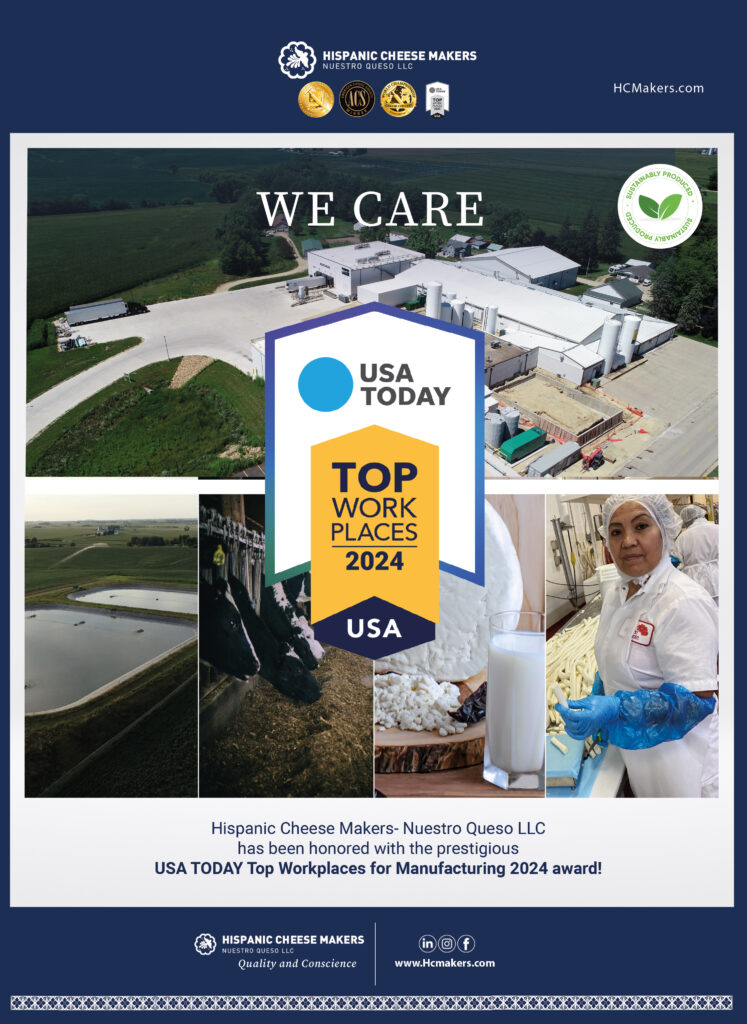CHICAGO — Hispanic Cheese
Makers-Nuestro Queso, a provider
of high-quality, authentic Hispanic-
style cheeses for private brand, co-
packing and ingredient manufactur-
ers, aims to be an industry leader
not only in its cheeses, but also in
its sustainability practices.
The company’s recent and ongo-
ing sustainability measures span from dairy farmer practices, to water and energy measures at its plants, to waste reduction in packaging.
“We sustainably conduct our busi-
ness and pride ourselves on being
a good corporate citizen. We care
deeply about how our ingredients,
packaging, products and services
are sourced, produced or performed
and expect the same from our sup-
pliers. We take excellent care of our
employees and ensure the welfare
of the cows that supply our milk,”
says Arturo Nava, senior marketing
director, Hispanic Cheese Makers-
Nuestro Queso.

Nava notes that the company has seen varying degrees of interest from its customers in sustainability, and it works with them to achieve their
sustainability goals and standards.
For example, the company has undergone an ESG (environmental, social and governance) audit that one of its customers requested.
“We find that select retailers with whom we do business, as well as certain manufacturers for whom we coanufacture, have higher levels of interest,” Nava says. “We find that customers are interested in not only the manufacturing practices and
systems, but they show interest in packaging as well. To that end, we have reached out to our vendors to provide data and information related to the use of recycled materials in the production of various packaging films. We share this information with them and have made it a part of the qualification of suppliers of
packaging.”
Hispanic Cheese Makers is focused on driving innovative packaging as well as products. Early last year, the company launched contoured cutting easy peel packaging that cuts nearly 33% of the consumer waste of the packaging and allows for a more convenient consumer experience. The use of this packaging also has allowed the company to be more productive on the factory floor as it has switched items to this type of packaging.
Also last year, Hispanic Cheese Makers launched a program with a dairy farmer to work with the company on GMO certification. The farmer grows their own feed, while Hispanic Cheese Makers is supporting a program with them for non-GMO feed for the milk they supply. Additionally, the company established a program where a portion of its whey output is sold back to the farmer as a food supplement for their dairy herd.
Water and energy sources are a major focus for the company at its manufacturing plant in Kent, Illinois. The facility makes use of reverse osmosis to blend water. Since 2018, Hispanic Cheese Makers has invested several millions of dollars into its
water systems, and the company actually maintains a sustainability reserve where its wastewater is stored and reused.
“The site is maintained as a natural habitat with prairie grasses surrounding the retention ponds,” Nava explains. “The water is then re-used to irrigate over 100 acres of farmland.”
Additionally, last year the company installed a natural gas generator that is large enough to operate its entire plant. This allows not only added certainty of backup power during a potential power outage, but Hispanic Cheese Makers also coordinates with its electric utility provider to utilize the generator from time to time to
run the plant and then sell back the unused power from the grid. The company plans to continue strengthening and adding to its sustainability efforts in the future as well.
“When the time is right, we will be looking at the potential for alternative energy use. We also own some farmland where this could be generated,”
Nava says. “We hope to be able to engage in a public-private partnership at some point in the future.” CMN
